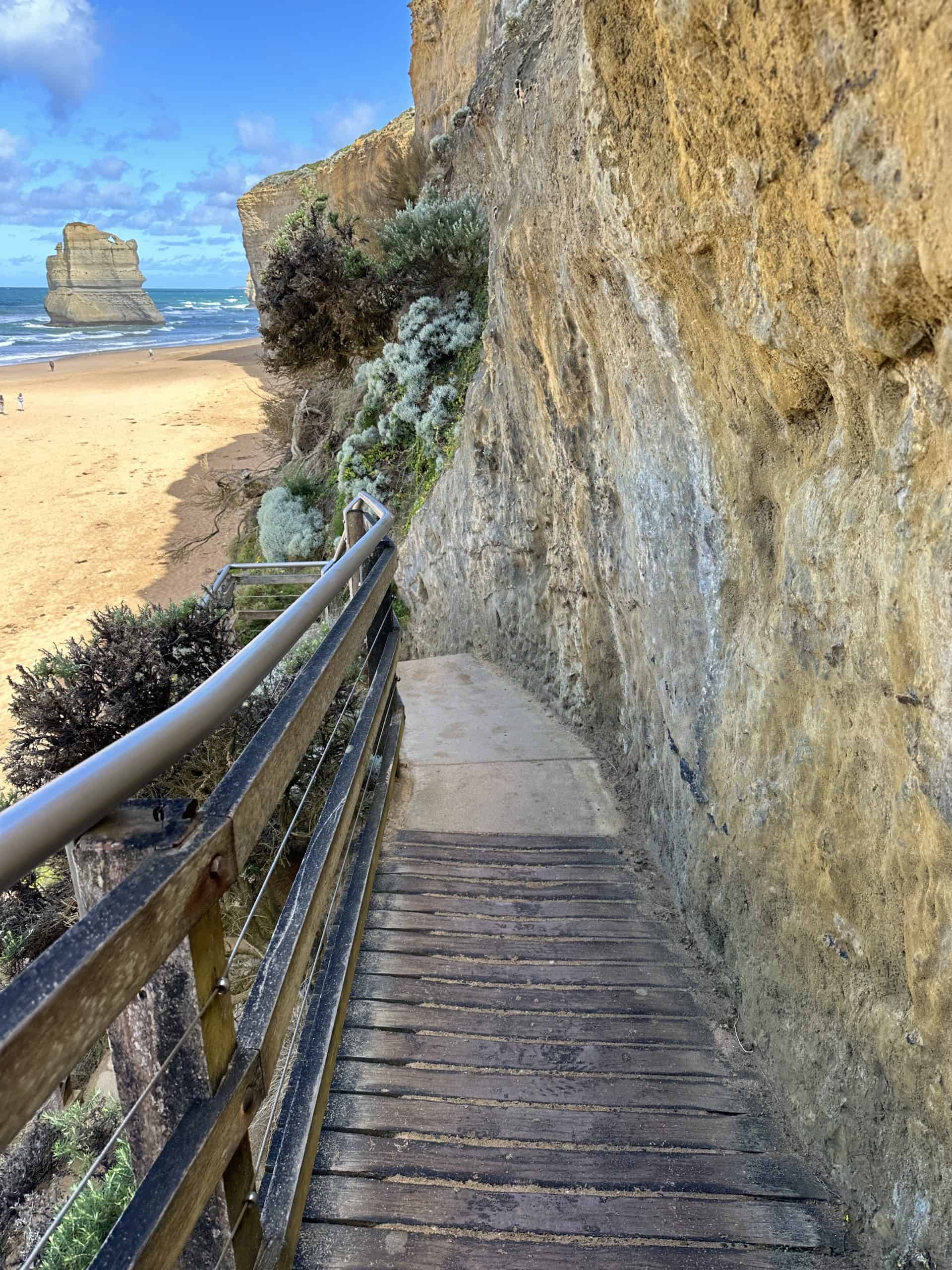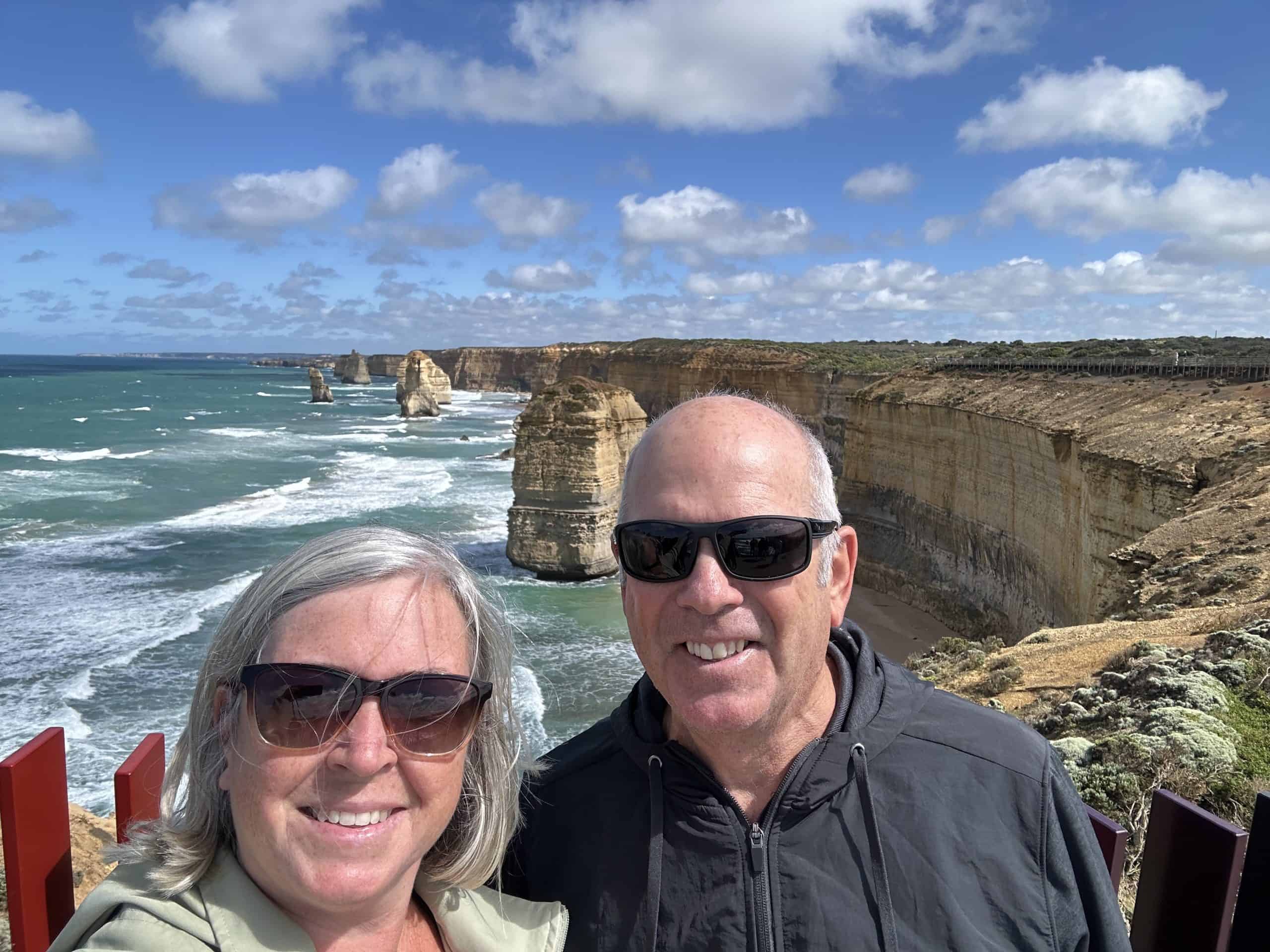The Ultimate Great Ocean Road In One Day Trip From Melbourne

Plan To Visit The Great Ocean Road
If you are visiting Melbourne in Victoria, we recommend you take a day to see the Great Ocean Road. This location is one of the most famous drives in Australia and that is for a good reason.
While we enjoyed the coastal locations of Sydney and Port Douglas, this coastal area of Australia is some of the most beautiful that we saw on our entire trip. It can be done in one day since in total it is 240 kms long. But this can make for a very long day.
We debated on driving it ourselves or taking a tour. Our main concern was that whoever was driving wouldn’t be able to take in the spectacular views, so we opted for a tour from Melbourne so both of us could fully enjoy the day.
This blog details the stops we made along the Great Ocean Road in one day and will hopefully help with planning your trip.
Highlights Of The Great Ocean Road
✅ Discover one of Australia’s most beautiful coastal roads with incredible viewpoints overlooking the ocean
✅ Learn about the history of this area including its World War 1 references and the incredible past it has with ships being destroyed in its waters
✅ Explore many of the little towns along this stretch of road
✅ See some of Australia’s coolest wildlife along the way
CHECK OUT OUR TOP TRAVEL RESOURCES
✦ Find superior accommodations on Expedia.com or Booking.com
✦ Book your rental car wth Discover Cars
About This Famous Road
First, we will share a quick history of the road itself. In the 1800s this area only had a dirt track and there was a dream to create a road to connect the seaside towns. After World War 1, the economy collapsed and there was a need for employment for the soldiers that came back from the war.

It was decided they would be used as labour to build the road and unbelievably they carried all the materials in by hand. It took 13 years to build it and it was completed in 1932. The road was dedicated to the soldiers who didn’t come back and is still recognized as a War Memorial.
Can I Do Great Ocean Road In A Day?
This Great Ocean Road itinerary can definitely be done in a day. You may want to drive it yourself or you may want to take a day tour. Whatever your choice, it can be done in one day but be prepared for it to be a long day, since you will want to stop very frequently to see all the beautiful locations along the way.
✅ If you are looking for a well run, 5 star tour to take you to this remarkable location, then check out the tour that we took. Our driver was professional, knowledgeable and really made sure that we experienced all that this area has to offer.
Reverse Itinerary
Whether you are driving on your own or taking a tour, we suggest following the idea of doing the drive in reverse. This means driving on the highway from Melbourne directly to the Twelve Apostles and working back from there. This is the tour we chose and we thought it made a lot of sense and helped to avoid the crowds at each of the stops.
It is important to know that if you take a tour (as opposed to driving it yourself), you likely won’t do the entire Great Ocean Road – there will be approximately 50 kms from Allansford to Port Campbell that won’t be included.
While we understood that this area is also scenic, we were ok to bypass it to have the main sights covered and have a driver do all the work. This in combination with the distance from Melbourne to Torquay is another 100 kms before you even get to the Great Ocean Road – makes for a long day of driving.
Where Is the Best Place to Start the Great Ocean Road?
As we mentioned, our tour took us to the most popular areas first. The driver headed out from Melbourne around 7:00am and we took the highway for a good portion of the drive and then through rural areas until we reached the Port Campbell National Park. The first stop was Gibson Steps where we could experience the beach without many people around.

We thought this was a wonderful idea and also allowed us to take some beautiful pictures with very few people around. We think heading to this section of the road first is the way to start the trip.
Walking Gibson Steps Beach
This is an incredible stretch of beach! Our driver arrived early so we were able to park nearby to the entrance. It is only a small parking lot so if you don’t get there early, you will need to park at the larger parking lot for the entrance to the Twelve Apostles and walk the 30 minutes to the start of the steps.

These steps were built by a farmer to allow him to collect supplies for his farm. It is an impressive staircase that zig zags across the side of the cliff. With 86 steps it isn’t too strenuous but we were glad it was dry as it looked like it could be tricky if wet.


We trekked down the steps and walked along the incredible expansive beach. It is super windy here and the water is not an area where you can swim due to the currents. But it is absolutely unspoilt with a gorgeous length of coast to visit. We have to say it is even more impressive than the famous Bondi Beach!

We loved seeing this area both from above at the lookout area and also from below.

The pictures don’t do it justice as the beach seems to stretch on forever. This is also where you start to see the incredible limestone pillars jutting out of the water. It was very exciting!

After a nice walk on the beach, we climbed back up to the van and drove a few minutes down the road to the next stop.
Are the 12 Apostles Worth Seeing?
Yes, yes, yes! We arrived at a second parking lot and quickly hopped out of the van to start the short walk to the first Twelve Apostles lookout point. It is a short walk of 500m to get to the initial point where you can see your first breathtaking view.


To be honest, it was an incredible moment to see these towering rock formations. We had been looking forward to this tour and were so thrilled that the weather had cleared and afforded us spectacular views.

It is amazing to think that the tops of the limestone pillars were originally the sea floor and over millions of years the wind and water have eroded away the land around them. As the water lowered, these cliffs were left in place.
Surprisingly we were told there were never really twelve pillars – only nine. And now due to additional erosion, only seven and a half are remaining.

We also learned that when the explorers sailed by in the 19th century, for some strange reason, they called the pillars sows and piglets. But in the 1920s when tourists started visiting this area it was changed to the Twelve Apostles, as we know it today. Ah, the power of marketing!
We continued down the boardwalk to check out the new lookout platform that was completed in the summer of 2024. It is an awesome extension, out over the rocks, that provides an accessible and safe way for visitors to see the iconic views.



We were impressed and thankfully experienced it early in the day before it was full of too many people.
Insider Tip
It can be quite windy here and based on the number of hats we saw down on the lower rocks, it is recommended you hold onto yours!

Be sure to really take some time and soak in the beauty of the area. It isn’t often that you see something still so pristine in nature. It was hard to tear ourselves away from this location and it was truly the best stop of the day.

Don’t Have Time To Read This Now? Pin It For Later:
Visiting Razorback
The Razorback is a tremendous, self-standing rock shelf that originally extended even further out into the sea. The waves continually crash against the rock, creating cracks and crevices that become widened by rainwater and large pieces have fallen off into the sea. But it is still incredibly big!

While admiring its majestic size, make sure to look at the top of the rock and observe its unusual top that has bumps and sharp edges. These have been caused by spray from ocean waves hardening small rocks that sit on top.

The incredible strength of the waves has created deep grooves that can be seen along the edges. You can see the levels of formation very well here and it is fascinating.
Checking Out Loch Ard Gorge
Also in this area is another location where you can take the pathways to view Loch Ard Gorge. This has several lookouts over a bay with a lovely beach that looks quite serene with two large limestone stacks.

This area was where the Loch Ard shipwreck that sank in 1878 was discovered in the 1960s using scuba gear. Interestingly if you find a wreck and no one else claims it, you can take it and all the contents inside.

The gentleman who found the wreck was unfortunately foiled by looters while obtaining the proper paperwork to lay claim to the ship so didn’t realize as much of a fortune as he hoped. But they did find interesting things like copper, crockery and brass items when it was inventoried.

This coastal area is also commonly called the Shipwreck Coast. This is because the 80km strait that they sailed through had treacherous waters and it was called threading the needle as they made their way through to land. Unfortunately many didn’t make it and it is thought that more than 700 ships have sunk in this area.

There are a lot of lookouts along this pathway where you can see the bay from various points of view. Our understanding is that there is another project underway to create a better lookout point in this area for viewing the blowhole so stay tuned.
Exploring The Rainforest
After taking in the amazing scenery, it was time to start on our way back to Melbourne. But this wasn’t the end of the tour, we still had many stops along the way.
We made a stop at the Melba Gully State Park which is part of the Great Otway National Park. This was vastly different from the views of the ocean we had been enjoying all morning.

We went for a walk along Madsen’s Track through this lush, green park down a path that eventually led to a stream at the bottom. And while we weren’t there at the right time, we were told that at night you can see glow worms here!

Some of the largest trees in Australia grow here, including the Mountain Ash, also known as the Gum Tree. Mature trees can grow up to 100m. Many are in this rainforested area, as well as massive tree ferns and old moss-covered trees along the well marked path and boardwalk. Similar in nature to the forests we saw in the Daintree.


The round-trip walk only takes about 30 minutes and is a nice way to break up the drive.
Stops Along The Coast
There are many little towns all along the coast. The drive in between each one is really beautiful with winding roads and lovely vistas out over the sea.

We stopped in Apollo Bay for our lunch and had some great fish and chips at the Apollo Bay Fisherman’s Co-op. It was very tasty. We only had a quick stop here but it looked like a cute town with shops.

We also stopped at Cape Patton. Here there is a lookout point where you can see the green hills sloping gently down to a rocky coast and the blue of the water along the shore. You can see a long way in both directions with no interruptions. This viewpoint that has been well constructed with a pull off from the road, reminded us of the great lookouts that you can find all over Sao Miguel in the Azores.

Another town along this stretch is Lorne. This location is larger than Apollo Bay and has more services available. It has a large beach and lots of park areas around where you could enjoy some relaxing time.

Since we were doing the itinerary in the reverse direction, we came across the official start of the Great Ocean Road sign at the end of the day. But of course, we made a quick stop to take the official photo.

Seeing Animals In The Wild
Another highlight on the way back was a stop at Aire River where we saw several koalas up in the trees. This is not a park or zoo or even a sanctuary like in Kuranda – it is just koalas hanging out in their natural habitat. They were pretty far up in the trees but it was very cool to see them in the wild.

We also passed the Anglesea Golf Course where many kangaroos enjoyed their afternoon snack in the grass. While this is commonplace to locals, it was a treat to see the kangaroos just minding their business, and enjoying the afternoon!

Treats For The Drive Home
Our tour made a final stop at the Great Ocean Road Chocolaterie. If you enjoy chocolate, be sure to make a stop here where you can see the chocolates being made and stock up on the yummy treats.


They also have a very nice ice cream station with artisanal flavours that they make. We couldn’t resist as this seemed like the perfect end to a perfect day as we settled in for the drive back to Melbourne.

✅ Save time and book the tour we did. We highly recommend it for a full day of exploring the Great Ocean Road.
The Final Word…Exploring The Great Ocean Road In One Day
To us this was a must do activity when we were in Victoria. The areas you can see are full of sheer raw beauty and provide such a wonderful day in nature. You spend the whole day in awe of your surroundings.
Whether you do a self-drive road trip or look at booking a tour, our recommendation is to just make the trip!
